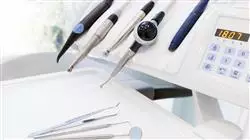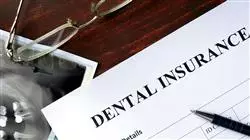University certificate
The world's largest faculty of dentistry”
Introduction to the Program
Help your patients improve their oral health by completing this comprehensive program designed by TECH"

This Professional master’s degree in Oral Medicine is based on the student acquiring in-depth knowledge of different types of oral cavity and adjoining tissue lesions, both benign and malignant, as well as diagnostic and surgical techniques, correct treatment approaches, professional application and preventive usefulness.
It is a very useful branch, since it complements the rest of the specialties, being a fundamental pillar prior to any treatment, avoiding negligence due to the lack of knowledge and making it possible to detect and treat pathologies, which may potentially save a patient’s life.
This academic program is characterized by its dynamic methodology that intersperses clinical cases for the student to identify and associate the subject matter explained with its corresponding image, as well as questionnaires to evaluate their knowledge and test them, bringing it as close as possible to those situations that will be presented daily in the office, to be able to focus and manage them in a coordinated, efficient and planned way, all under the guidance of working professionals who will help during the learning process to achieve a complete education in all aspects.
It is based on promoting lasting and quality learning through schematically structured scientific information, always focusing on the main aspects of each pathology in order to be able to apply it in daily practice immediately after each unit.
The dentist will strengthen their personal confidence and decision-making abilities when practising, with special emphasis on diagnostic and preventive aspects, differentiating, according to specific characteristics, the different types of lesions so that their learning is fluid and effective.
As it is an online Professional master’s degree, the student is not hindered by fixed schedules or the need to move to a physical location, but can access the contents at any time of the day, balancing their professional or personal life with their academic life.
Only with adequate education will you learn the best way to advise your patients in Oral Medicine cases"
This Professional master’s degree in Oral Medicine contains the most complete and up to date scientific program on the market. The most important features include:
- More than 75 clinical cases presented by experts in Oral Medicine
- The graphic, schematic and practical contents of the course are designed to provide all the essential information required for professional practice
- Exercises where the self-assessment process can be carried out to improve learning
- Algorithm-based interactive learning system for decision making for the orally impaired patient
- Theoretical lessons, questions to the expert, debate forums on controversial topics, and individual reflection assignments
- Content that is accessible from any fixed or portable device with an Internet connection
This Professional master’s degree is the best investment you can make in the selection of a refresher program for two reasons: in addition to updating your knowledge in Oral Medicine, you will obtain a qualification from TECH Global University"
It includes, in its teaching staff, professionals belonging to the field of Oral Medicine, who contribute their work experience to this program, as well as leading specialists from prestigious societies and universities.
The multimedia content, developed with the latest educational technology, will provide the professional with situated and contextual learning, i.e., a simulated environment that will provide immersive training programmed to train in real situations.
This program is designed around Problem-Based Learning, whereby the professional must try to solve the different professional practice situations that arise throughout the program. To do so, the professional will be assisted by an innovative interactive video system created by renowned and experienced experts in Oral Medicine.
This Professional master’s degree offers training in simulated environments which provides an immersive learning experience designed to train for real-life situations"

This 100% online Professional ’Master’s Degree will allow you to balance your studies with your professional work while increasing your knowledge in this field"
Why study at TECH?
TECH is the world’s largest online university. With an impressive catalog of more than 14,000 university programs available in 11 languages, it is positioned as a leader in employability, with a 99% job placement rate. In addition, it relies on an enormous faculty of more than 6,000 professors of the highest international renown.

Study at the world's largest online university and guarantee your professional success. The future starts at TECH”
The world’s best online university according to FORBES
The prestigious Forbes magazine, specialized in business and finance, has highlighted TECH as “the world's best online university” This is what they have recently stated in an article in their digital edition in which they echo the success story of this institution, “thanks to the academic offer it provides, the selection of its teaching staff, and an innovative learning method aimed at educating the professionals of the future”
A revolutionary study method, a cutting-edge faculty and a practical focus: the key to TECH's success.
The most complete study plans on the university scene
TECH offers the most complete study plans on the university scene, with syllabuses that cover fundamental concepts and, at the same time, the main scientific advances in their specific scientific areas. In addition, these programs are continuously being updated to guarantee students the academic vanguard and the most in-demand professional skills. In this way, the university's qualifications provide its graduates with a significant advantage to propel their careers to success.
TECH offers the most comprehensive and intensive study plans on the current university scene.
A world-class teaching staff
TECH's teaching staff is made up of more than 6,000 professors with the highest international recognition. Professors, researchers and top executives of multinational companies, including Isaiah Covington, performance coach of the Boston Celtics; Magda Romanska, principal investigator at Harvard MetaLAB; Ignacio Wistumba, chairman of the department of translational molecular pathology at MD Anderson Cancer Center; and D.W. Pine, creative director of TIME magazine, among others.
Internationally renowned experts, specialized in different branches of Health, Technology, Communication and Business, form part of the TECH faculty.
A unique learning method
TECH is the first university to use Relearning in all its programs. It is the best online learning methodology, accredited with international teaching quality certifications, provided by prestigious educational agencies. In addition, this disruptive educational model is complemented with the “Case Method”, thereby setting up a unique online teaching strategy. Innovative teaching resources are also implemented, including detailed videos, infographics and interactive summaries.
TECH combines Relearning and the Case Method in all its university programs to guarantee excellent theoretical and practical learning, studying whenever and wherever you want.
The world's largest online university
TECH is the world’s largest online university. We are the largest educational institution, with the best and widest online educational catalog, one hundred percent online and covering the vast majority of areas of knowledge. We offer a large selection of our own degrees and accredited online undergraduate and postgraduate degrees. In total, more than 14,000 university degrees, in eleven different languages, make us the largest educational largest in the world.
TECH has the world's most extensive catalog of academic and official programs, available in more than 11 languages.
Google Premier Partner
The American technology giant has awarded TECH the Google Google Premier Partner badge. This award, which is only available to 3% of the world's companies, highlights the efficient, flexible and tailored experience that this university provides to students. The recognition as a Google Premier Partner not only accredits the maximum rigor, performance and investment in TECH's digital infrastructures, but also places this university as one of the world's leading technology companies.
Google has positioned TECH in the top 3% of the world's most important technology companies by awarding it its Google Premier Partner badge.
The official online university of the NBA
TECH is the official online university of the NBA. Thanks to our agreement with the biggest league in basketball, we offer our students exclusive university programs, as well as a wide variety of educational resources focused on the business of the league and other areas of the sports industry. Each program is made up of a uniquely designed syllabus and features exceptional guest hosts: professionals with a distinguished sports background who will offer their expertise on the most relevant topics.
TECH has been selected by the NBA, the world's top basketball league, as its official online university.
The top-rated university by its students
Students have positioned TECH as the world's top-rated university on the main review websites, with a highest rating of 4.9 out of 5, obtained from more than 1,000 reviews. These results consolidate TECH as the benchmark university institution at an international level, reflecting the excellence and positive impact of its educational model.” reflecting the excellence and positive impact of its educational model.”
TECH is the world’s top-rated university by its students.
Leaders in employability
TECH has managed to become the leading university in employability. 99% of its students obtain jobs in the academic field they have studied, within one year of completing any of the university's programs. A similar number achieve immediate career enhancement. All this thanks to a study methodology that bases its effectiveness on the acquisition of practical skills, which are absolutely necessary for professional development.
99% of TECH graduates find a job within a year of completing their studies.
Professional Master's Degree in Oral Medicine
In the United States alone, about 53,260 people had oropharyngeal and oral cavity cancers in 2020, according to estimates from the American Cancer Society. Of that number, about 10,750 people died from them. If we put this into statistical perspective, it means that approximately 20% of those who contracted these pathologies could not be saved, which, in retrospect, is quite a considerable indicator. Faced with this scenario, it is essential to update and deepen the knowledge on how to perform correct anamnesis and treatment. It is for this reason that TECH Global University offers its Professional Master's Degree in Oral Medicine: an online program designed by the most competent team of experts in the field that will provide you with access to theoretical components and technical procedures totally useful and innovative. Based on a Relearning teaching model that leads globally in the framework of online education, we will provide you with a rigorous scientific outline that addresses the most required trends in the market so that you can give a significant weight to your work as a professional.
Become a notable oral health practitioner
In an area as methodical and succinct as dental practice, every detail counts: knowing about biopsy and staining techniques, knowing how to elucidate between a bacterial and a fungal infection, fully understanding salivary functions and the temporomandibular joint, having the expertise to act in the face of anaphylactic shock, among many other and varied considerations. Unfortunately, many of these specific knowledge are not sufficiently addressed or deepened within the academic curriculum of the average career; it is necessary, therefore, a complete update that fits in the same way, both new technological inventions in the market, as imminent pathologies that are discovered during the practice of the profession. In TECH we train you to have enough confidence to practice a risky surgical intervention or to apply palliative techniques for oncology patients. Never before has achieving excellence in a field as broad as oral health been as easy and complete as it is today.







